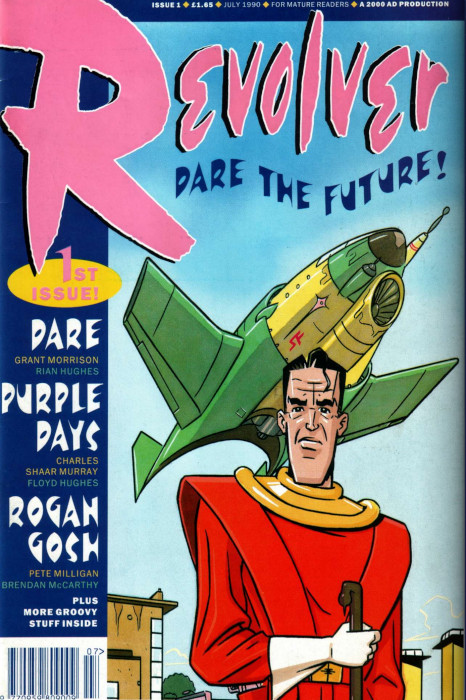 Revolver
Revolver
Publisher: Fleetway Publications
Format: Monthly anthology
First Issue: Revolver #1 (July 1990)
Last Issue: Revolver #7 (January 1991)
Annuals and Specials: Revolver Horror Special,
Revolver Romance Special
Absorbed: None
Absorbed into: None officially, but two stories
transferred to Crisis.
Strips: 51 Stars, All
Around the World, Circular Motion, The
Crossing, Dare, Did I? Did I?
Did I? Did I In My Own Self Shine?, Dire Streets,
God's Little Acre, The Greatest,
Happenstance & Kismet, Martello
117, Nine Inches to the Mile, Pinhead
Nation, Plug into Jesus, Purple
Days, Rogan Gosh, The
Secret Garden, Waltz, Zen
& the Art of Shopping
Comments: Touted as a 2000 A.D. spin-off despite
having little to do with its "parent" title other than lip service and
some overlapping creators, Revolver was short-lived attempt by Fleetway
Publications to produce a comic aimed to appeal to a more mature audience,
similar to the successful Deadline.
It's title was meant to reflect that it would contain diverse and
revolving content, and to be fair to the magazine, it did achieve that.
Looking at that content with the benefit of a few decades of hindsight my
personal suspicions are that one of the reasons it failed to find an
audience is that said content was trying just a tad too hard to be edgy,
experimental or surreal. An anthology title can afford to have a few
stories that are like that, but not the majority, or at least not unless
they are also very engaging, and that simply (in my humble opinion) wasn't
the case for Revolver.
Revolver had six ongoing stories (though to
call Pinhead Nation's episodes stories might be a stretch), and a bundle
of one-off tales. Arguably the headliner, given it got the front cover of
#1, was Grant Morrison's political and very different take on Dan
Dare; when a story about a spaceman writen by Grant "The
Invisibles/Doom Patrol" Morrison is the most down-to-Earth, least surreal
story in your comic, you might be aiming the weirdness factor a little too
high.
Revolver only lasted seven issues, plus two
specials - a Horror Special released near Halloween 1990, and a Romance
Special released after the regular series ended - both of which carried
only new one-off tales. With only one installment left to go, Dare
transferred to Crisis#56 to conclude his storyline, and humour strip
Happenstance & Kismet also transferred there, enjoying a slightly
longer run in its new home, lasting from Crisis#56-61.
|
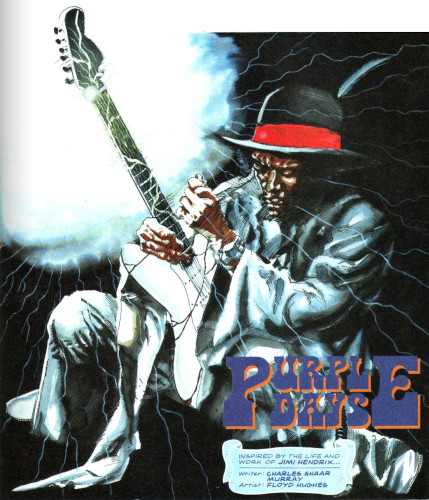 Purple Days by Charles Shaar Murray and
Floyd Hughes was a biographical strip inspired by the life of
musician Jimmy Hendrix. It continued through all seven issues of
Revolver, with the final episode noting it was the "End of Book
One." However, as far as I know, Book Two never saw publication
anywhere else. Purple Days by Charles Shaar Murray and
Floyd Hughes was a biographical strip inspired by the life of
musician Jimmy Hendrix. It continued through all seven issues of
Revolver, with the final episode noting it was the "End of Book
One." However, as far as I know, Book Two never saw publication
anywhere else.
|
|
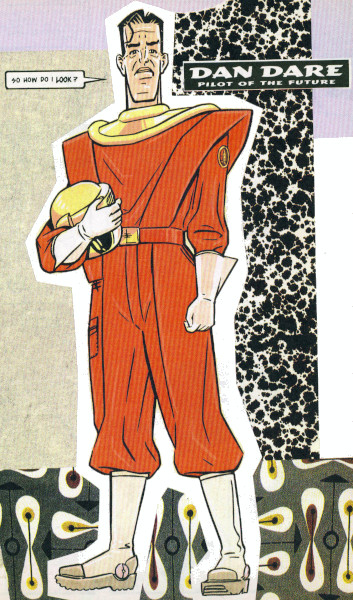 Dare by Grant Morrison and Rian Hughes was
a new spin on the classic British hero Dan
Dare that saw him retired and disillusioned, only to be
lured back into the limelight by a corrupt government. Clearly
meant to be an indictment of Margaret Thatcher's government, it
ran through all seven issues of Revolver, with the concluding
segment appearing in Crisis#56. Dare by Grant Morrison and Rian Hughes was
a new spin on the classic British hero Dan
Dare that saw him retired and disillusioned, only to be
lured back into the limelight by a corrupt government. Clearly
meant to be an indictment of Margaret Thatcher's government, it
ran through all seven issues of Revolver, with the concluding
segment appearing in Crisis#56.
|
|
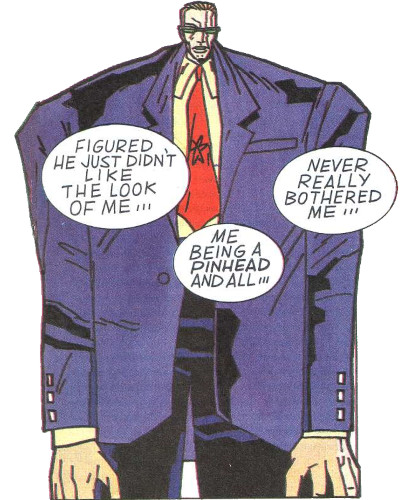 Pinhead Nation by Shaky Kane appeared
in Revolver#1-6, and the cover of #7. It featured the bizarre
ruminations of a pinheaded man who would talk directly to the
reader (or an unseen visitor) about his life. We never learned his
name. Pinhead Nation by Shaky Kane appeared
in Revolver#1-6, and the cover of #7. It featured the bizarre
ruminations of a pinheaded man who would talk directly to the
reader (or an unseen visitor) about his life. We never learned his
name.
|
|
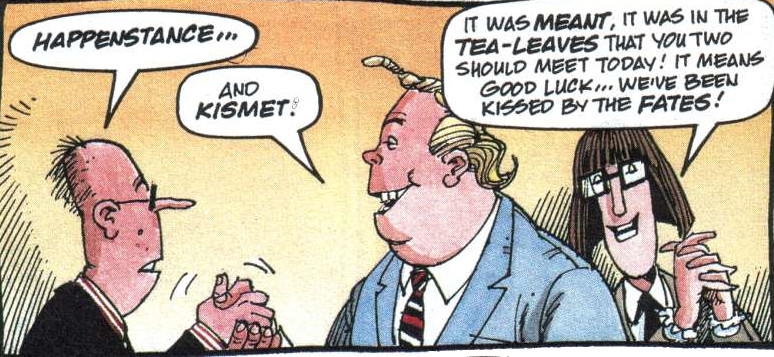 Happenstance and Kismet by Paul Neary
and Steve Parkhouse was a humorous tale about the misadventures of
two very disparate new acquaintances who find themselves in ever
more absurd and incredible circumstances. Easily one of Revolver's
best strips, it ran in all seven issues, before transferring to
Crisis for a further six episodes. Happenstance and Kismet by Paul Neary
and Steve Parkhouse was a humorous tale about the misadventures of
two very disparate new acquaintances who find themselves in ever
more absurd and incredible circumstances. Easily one of Revolver's
best strips, it ran in all seven issues, before transferring to
Crisis for a further six episodes.
|
|
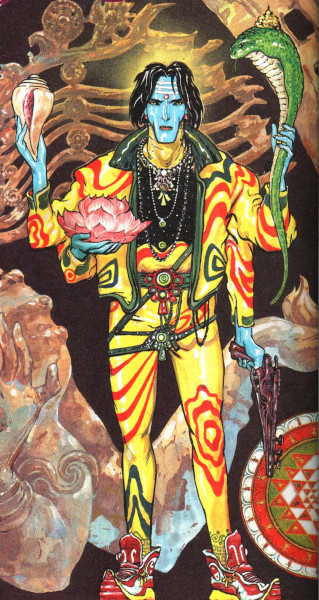 Rogan Gosh by Pete Milligan and Brendan
McCarthy was a psychedelic trip into the the world of the titular
Karmanaut, and ran in Revolver#1-6. The story was later
gathered into a one-shot by Vertigo Comics. Rogan Gosh by Pete Milligan and Brendan
McCarthy was a psychedelic trip into the the world of the titular
Karmanaut, and ran in Revolver#1-6. The story was later
gathered into a one-shot by Vertigo Comics.
|
|
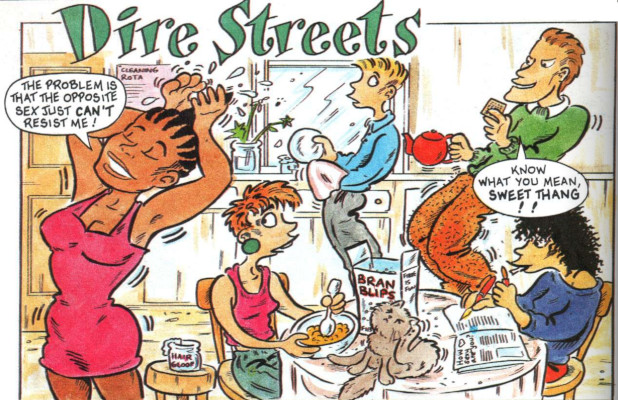 Dire Streets by Julie Hollings appeared
in Revolver#1-3 and 5-6, and featured a group of twenty-something
college (or university) flatmates. Why anyone thought it was a
good strip for the magazine is beyond me - to give you an idea of
the type of tales it recounted, the story in #1 revolved round the
group's most promiscuous member learning she might have an STD and
covered her going to get tested and having to call round all her
recent conquests to inform them she might have infected them. Dire Streets by Julie Hollings appeared
in Revolver#1-3 and 5-6, and featured a group of twenty-something
college (or university) flatmates. Why anyone thought it was a
good strip for the magazine is beyond me - to give you an idea of
the type of tales it recounted, the story in #1 revolved round the
group's most promiscuous member learning she might have an STD and
covered her going to get tested and having to call round all her
recent conquests to inform them she might have infected them.
|
|
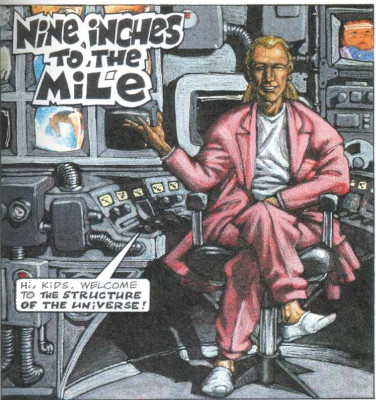 Nine Inches to the Mile by Phil Winslade
and Igor Goldkind was a one-off strip that discussed the nature of
reality being really only based on individual perception. It ran
in Revolver#1. Nine Inches to the Mile by Phil Winslade
and Igor Goldkind was a one-off strip that discussed the nature of
reality being really only based on individual perception. It ran
in Revolver#1.
|
|
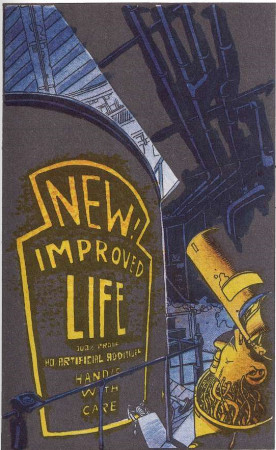 God's Little Acre by Ian Edginton and
D'Israeli in Revolver#2 showed a celestial workman delivering the
latest version of life to God. God's Little Acre by Ian Edginton and
D'Israeli in Revolver#2 showed a celestial workman delivering the
latest version of life to God.
|
|
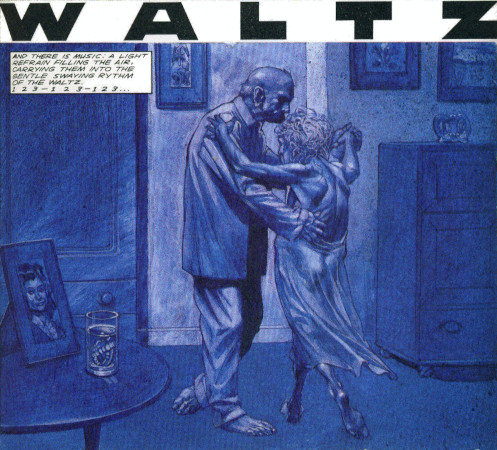 Waltz by Ian Salmon and Glenn Fabry
appeared in Revolver#3, and told the tale of an elderly man
remembering his life with his wife as he dies in his bed. Waltz by Ian Salmon and Glenn Fabry
appeared in Revolver#3, and told the tale of an elderly man
remembering his life with his wife as he dies in his bed.
|
|
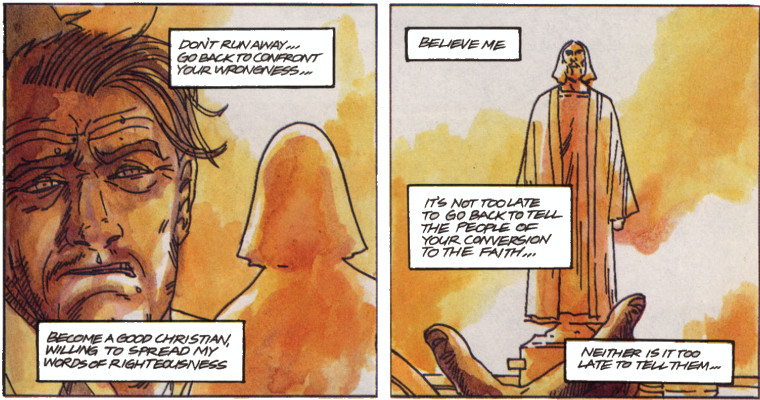 Plug into Jesus by Gary Pleece and
Warren Pleece appeared in Revolver#4. It depicted how the life of
a man who bought a gas station Jesus figurine had his life
initially improved and then ended by its influence. Plug into Jesus by Gary Pleece and
Warren Pleece appeared in Revolver#4. It depicted how the life of
a man who bought a gas station Jesus figurine had his life
initially improved and then ended by its influence.
|
|
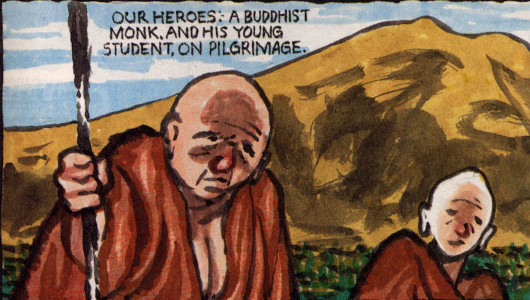 The Crossing by Al Davison appeared
in Revolver#4 recounted an old Buddhist parable. The Crossing by Al Davison appeared
in Revolver#4 recounted an old Buddhist parable.
|
|
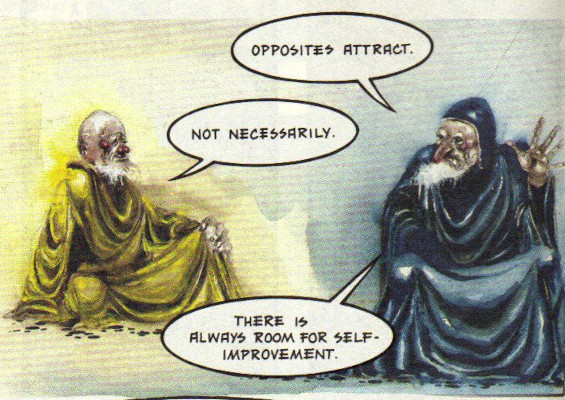 Circular Motion by Simon Harrison
appeared in Revolver#5 depicted the philosophical argument between
two old men, with a humorous strip. Inconsequential, but one of
the better and funnier one-shots. Circular Motion by Simon Harrison
appeared in Revolver#5 depicted the philosophical argument between
two old men, with a humorous strip. Inconsequential, but one of
the better and funnier one-shots.
|
|
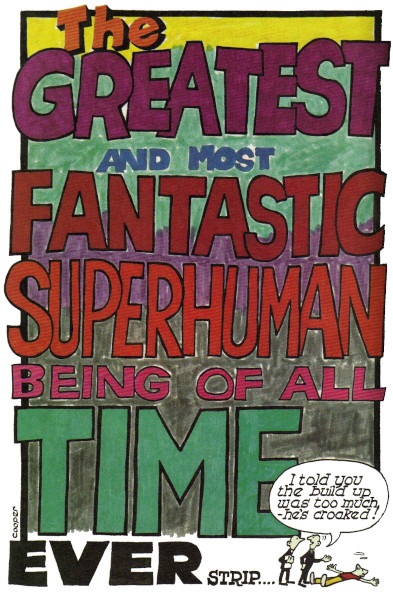 The Greatest by Peter Cooper appeared
in Revolver#5 - no need for me to summarise this one, as the
entire strip can be seen to the right. I can't call it a bad
strip, if only because it barely counts as one. The Greatest by Peter Cooper appeared
in Revolver#5 - no need for me to summarise this one, as the
entire strip can be seen to the right. I can't call it a bad
strip, if only because it barely counts as one.
|
|
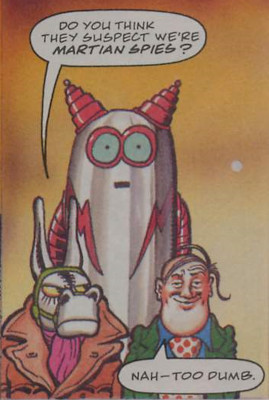 Martello 117 by Keith Page appeared
in Revolver#6 told the tale of Martian invaders who decided to
disguise themselves as cult television personalities...such as
Muffin the Mule. Martello 117 by Keith Page appeared
in Revolver#6 told the tale of Martian invaders who decided to
disguise themselves as cult television personalities...such as
Muffin the Mule.
|
|
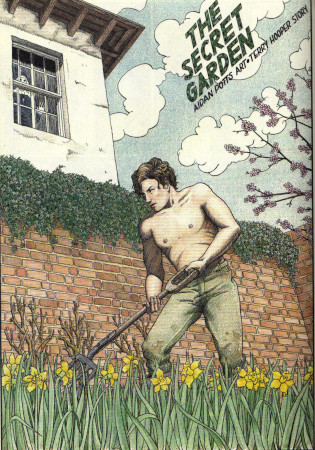 The Secret Garden by Aidan Potts and
Terry Hooper appeared in Revolver#7. An inoffensive and
inconsequential story about a Nun who has a secret crush on a
hunky gardener so she buys him a Valentine Days card which she
gives him anonymously. Seriously, that's all that happens. The Secret Garden by Aidan Potts and
Terry Hooper appeared in Revolver#7. An inoffensive and
inconsequential story about a Nun who has a secret crush on a
hunky gardener so she buys him a Valentine Days card which she
gives him anonymously. Seriously, that's all that happens.
|
|
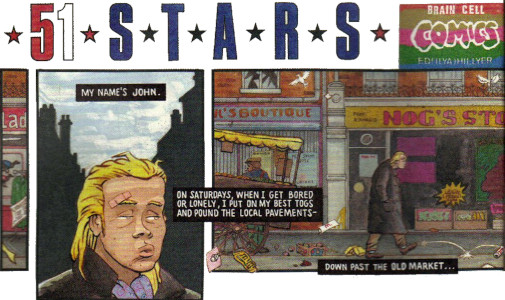 51 Stars by Ed Hillyer appeared in
Revolver#7. I struggle to describe the story because nothing
really happens - we follow a man called John around on a boring
day where he goes to the supermarket, the pub, buys a takeaway,
gets drunk at home, throws up and passes out. Seriously, that's
the whole tale. 51 Stars by Ed Hillyer appeared in
Revolver#7. I struggle to describe the story because nothing
really happens - we follow a man called John around on a boring
day where he goes to the supermarket, the pub, buys a takeaway,
gets drunk at home, throws up and passes out. Seriously, that's
the whole tale.
|
|
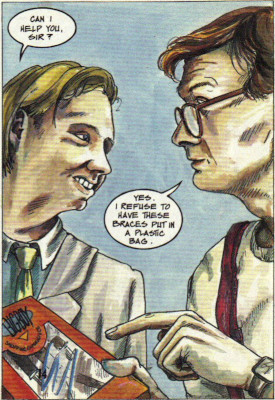 Zen & the Art of Shopping by Tony
Allen and Shanti appeared in Revolver#7. A man decides he needs
new braces, so he goes to the shops, finds some, then argues with
the manager over the ethics of the packaging until he utterly
confuses the manager, and the man seizes the opportunity to get
out the shop without paying. Another strip where you finish
wondering why anyone would be interested in the story. Zen & the Art of Shopping by Tony
Allen and Shanti appeared in Revolver#7. A man decides he needs
new braces, so he goes to the shops, finds some, then argues with
the manager over the ethics of the packaging until he utterly
confuses the manager, and the man seizes the opportunity to get
out the shop without paying. Another strip where you finish
wondering why anyone would be interested in the story.
|
|
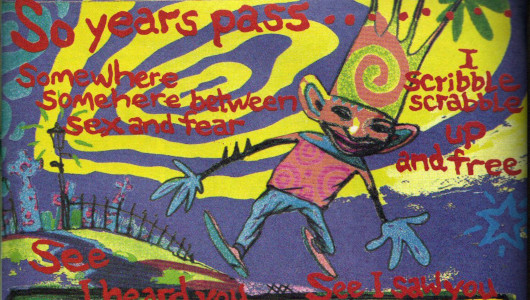 Did I? Did I? Did I? Did I In My Own Self Shine?
by Brendan McCarthy appeared in Revolver#7. Two pages consisting
of four psychedelic panels where nothing actually happens. Did I? Did I? Did I? Did I In My Own Self Shine?
by Brendan McCarthy appeared in Revolver#7. Two pages consisting
of four psychedelic panels where nothing actually happens.
|
|
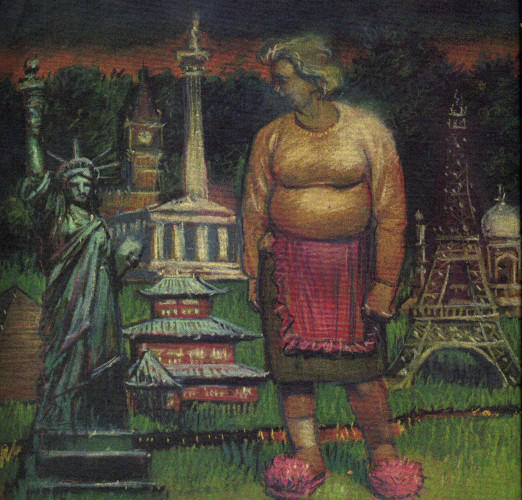 All Around the World by Si Spencer and
Sean Phillips appeared in Revolver#7. An old man has built models
of world attractions; his wife thinks they've wasted their lives,
so he burns it all down. An inconsequential tale, but the art is
decent and at least there actually is a story, which puts it head
and shoulders above the other one-shot fillers in the final issue
of Revolver. All Around the World by Si Spencer and
Sean Phillips appeared in Revolver#7. An old man has built models
of world attractions; his wife thinks they've wasted their lives,
so he burns it all down. An inconsequential tale, but the art is
decent and at least there actually is a story, which puts it head
and shoulders above the other one-shot fillers in the final issue
of Revolver.
|
The Revolver specials were full of one-shot
tales, some good, many not so much. I may get around to listing them
eventually.
CLARIFICATIONS:
Revolver should not be confused with:
- any other similarly named comic
First Posted: Circa 13/09/2019
Last updated: 09/06/2023
Back to General UK Comic Book
Heroes.
Back to UK Superheroes Main
Page.
Home.
All images and characters depicted on this site are
copyright their respective holders, and are used for informational
purposes only. No infringement is intended and copyrights remain at
source.
 Revolver
Revolver
 Revolver
Revolver